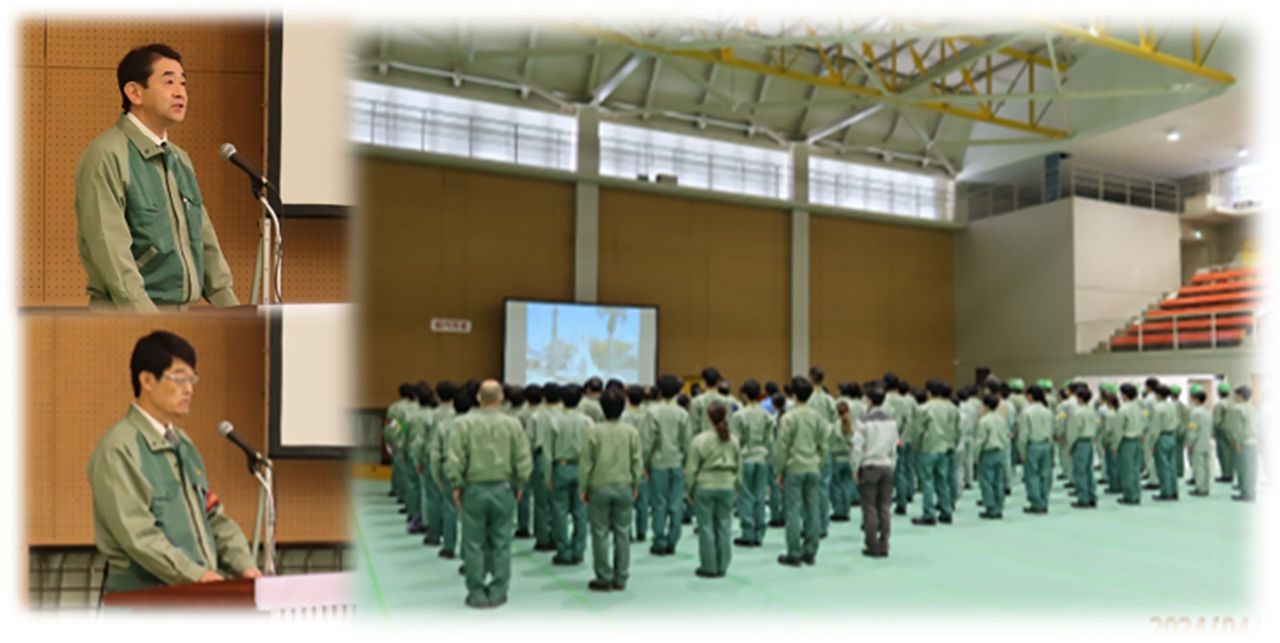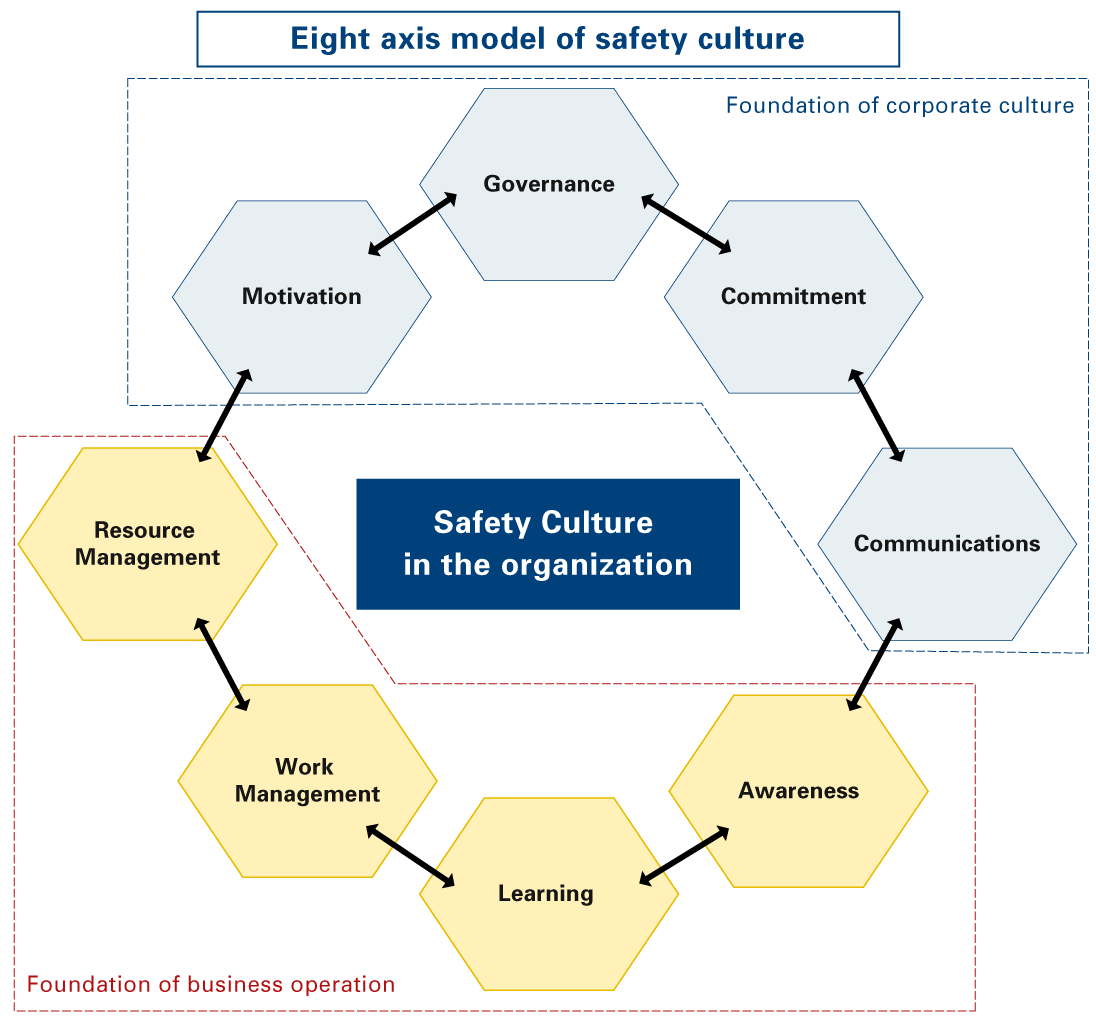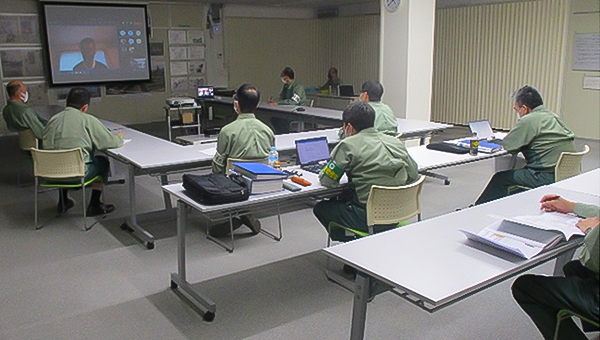Based on our management policy of making safety the top priority in everything that we do, we have continued to implement a range of safety activities throughout the Mitsui Chemicals Group. Nevertheless, an explosion and fire occurred at the resorcinol production facility inside our Iwakuni-Ohtake Works in 2012. We take this latest incident very seriously and will strive to prevent any future recurrence. Reflecting on that incident, we have been implementing a series of initiatives to prevent major accidents such as fundamental safety measures to ensure that nothing like that ever happens again.
Safety and Prevention
Initiatives to Prevent Major Accidents
Top Management’s Strong Commitment to Safety and Prevention
On Safety Day and during National Safety Week, etc., the President of Mitsui Chemicals repeatedly conveys to all Group employees that they follow the management policy of “making safety the top priority in everything they do.” In addition, we are working to ensure active involvement in activities to nurture our safety culture at worksites by having executives, including the Executive of the Production & Technology Center, visit Mitsui Chemicals Works and each production site of our domestic and overseas affiliates. The fiscal 2024 results are as follows.
- Instructions to make safety the top priority provided directly to employees at Head Office during the opening address (simultaneously broadcast to all domestic sites)
- Broadcasting the President’s Safety Day moral discourse across the Group as a whole (in Japanese and English)
- Communicated safety instructions directly to employees at the Works on Safety Day (broadcast pre-recorded video to all domestic production sites)
- Broadcasting the President’s National Safety Week message across the Group as a whole (in Japanese, English and Chinese)
- Direct safety instructions provided to employees at Works through safety talks and the like.
- Publishing of features on safety in the company newsletter with messages to employees
Safety Day
To keep alive the memory of the resorcinol production facility explosion and fire accident, Mitsui Chemicals has designated April 22, the day of the accident, as Safety Day. it is a day on which a safety pledge ceremony and presentations take place at each site every year.
In fiscal 2024, a video of the President's moral discourse on safety was broadcast to all sites. The ceremony at the Head Office was attended by the Senior Managing Executive Officer (CTO), as well as officers and general managers who work at the Head Office. In addition, the President participated in the ceremony at the Iwakuni-Ohtake Works, together pledging with all employees that "safety is our top priority."
 Safety pledge ceremony at Iwakuni-Ohtake Works (April 2024)
Safety pledge ceremony at Iwakuni-Ohtake Works (April 2024)
Development of Fundamental Safety Measures
Mitsui Chemicals takes the explosion and fire at the resorcinol production facility at the Iwakuni-Ohtake Works on April 22, 2012, extremely seriously. For these past 11 years, we have been introducing a series of fundamental safety measures to thoroughly review and improve safety and prevention throughout the company. Since fiscal 2022, we have refined the fundamental safety measures developed to date as "new fundamental safety measures" to realize the "ideal state of safety" and pursue accident-free and disaster-free operations across the entire Mitsui Chemicals Group.
Overview of Efforts Aimed at Advancing New Fundamental Safety Measures
New fundamental safety measures are being implemented by the entire Mitsui Chemicals Group, including its subsidiaries and affiliates.
*1 Steering committee:
To make swift progress in fundamental safety measures, the members shown in the diagram meet to discuss Group-wide issues and set the direction of activities.
*2 PL: Part Leader
Initiatives Aimed at Advancing New Fundamental Safety Measures
We defined three issues and seven strategies for new fundamental safety measures, which are incorporated into specific measures at the Head Office, Works, and domestic subsidiaries and affiliates. In fiscal 2024 as well, in addition to the existing dialogue between Head Office management and Works, we continued to implement initiatives such as education, safety culture assessment, and advanced risk assessment (RA), work style reform for Works, development of young employees, empowerment of women, and self-reliant career support measures, while expanding the scope of these measures to our affiliates and to the entire Group.
"Issues and Strategies" for New Fundamental Safety Measures
| Challenge 1: Line managers must be able to manage generational change and work style reform. | |
|---|---|
| Strategy (1): Reduce workload in the Works. | |
| Strategy (2): Further strengthen line managers’ management skills. | |
| Challenge 2: Further improve technical skills and ensure that skills are passed down. | |
| Strategy (3): Strengthen the operation of the technical evaluation system and upgrade risk assessment. | |
| Challenge 3: Ensure that safety is a top priority, foster a sense of professionalism, and provide a sense of accomplishment in their work. | |
| Strategy (4): Reinforce making safety the top priority. | |
| Strategy (5): Cultivate and bolster professionalism through independence and autonomy (self-discipline). | |
| Strategy (6): Improve teamwork, communications within organizations, and inter-organizational collaboration. | |
| Strategy (7): Enhance career development plans for young employees and line managers. | |
Initiatives to Achieve VISION 2030
Our group has established “Incidence of major accidents & serious occupational injuries: Zero” as a key performance indicator and target, serving as a non-financial metric under VISION 2030. To achieve this goal, we have set numerical targets: “Incidence of abnormal conditions/accidents*1: 5 or less” and “Work-related significant occupational Injuries frequency*2: 0.15 or less.” In addition, we have identified three key priorities to accomplish these objectives.
We systematically advance our efforts by incorporating strategies for each priority into our annual action plans as specific yearly objectives.
*1 Abnormal conditions/accidents:
Events that were legally handled as an abnormal condition or accident among the reported explosions, fires, leakages, bursts, breakages, or abnormal reactions.
However, such abnormal conditions or accidents exclude leakage of CFCs and small amount leakages.
*2 Work-related Significant Occupational Injuries (WSOIs) Frequency:
WSOIs do not include injuries that are not directly related to operations. In its definition of WSOIs, the Group not only includes occupational injuries that result in absence from work, but also lighter occupational injuries that may not result in absence from work but have serious causes of injuries. The Group monitors the WSOIs frequency as a KPI as well.
Establish an Advanced Risk Assessment System
Mitsui Chemicals has conducted hazard source identification, risk assessment, and risk reduction during startup, shutdown, emergency, and other non-routine operations in addition to new construction, expansion, and modification of facilities. With the aim of establishing an even more advanced risk assessment (RA) system, Mitsui Chemicals is working toward achieving "identification of hazard sources from a comprehensive perspective," "risk assessment without variation among assessors," and "reliable risk reduction."
For "identification of hazard sources from a comprehensive perspective," in order to eliminate variations in the competence among those who conduct RA, RA leaders who promote RA in the workplace are trained and assigned after their competence is certified. For "risk assessment without variation among assessors," we have introduced a quantitative risk assessment method (HAZOP-LOPA*). For "reliable risk reduction," RA advisors, who provide advice and guidance across Works, check the validity of RA results from a third-party perspective.
These activities were first introduced at the Osaka Works in fiscal 2020, followed by the Ichihara Works and Iwakuni-Ohtake Works, and implementation began at all Works of Mitsui Chemicals in fiscal 2023. In addition, RA specialists are assigned at the Head Office to promote and support the system across the Company.
Our company will continue to promote the establishment of an Advanced risk assessment and strengthen our voluntary safety measures.
* HAZOP-LOPA:
Hazard and Operability Studies-Layer of Protection Analysis.
A way to determine additional risk reduction measures by ascertaining the frequency [/y] of "impacts" (fire, explosion, etc.) for each "cause" of deviation and possible "impact" identified in HAZOP, which assumes and exhaustively analyzes deviations from normality, as the product of the probability of occurrence of the cause and the probability that existing safety measures will be breached.
Upgrading to Smart Works (Safety and Prevention with Advanced Technology)
By effectively adopting advanced technologies, the Mitsui Chemicals Group aims to upgrade to next-generation works (Smart Works) that function in a highly efficient, safe, and stable manner.
Key Technologies Introduced
| Primary Objectives | Specific technologies |
|---|---|
| Early detection of facility abnormalities and leakage, failure prediction | Wireless vibration sensors, gas leak detection cameras, abnormality prediction detection systems, rotating machinery current trend diagnosis, wireless ultrasonic thickness measurement systems, etc. |
| Improving safety | Occupational injury hazard detection AI, work risk detection technology, cybersecurity for control systems, etc. |
| Worksite work support and operational efficiency improvements | Wearable cameras, mobile terminals for worksite work support, etc. |
| Improving the efficiency of operation | Automated and optimized operation technology using AI |
We continue to strengthen our production technology by reforming factory operations and safety management with advanced technologies to achieve safer and more stable production. As part of this initiative, we are also engaged in nurturing data scientists specialized in production technology who can perform data analysis on complex phenomena in chemical plants and build models to predict plant conditions.
Safety Culture Assessment
The Mitsui Chemicals Group is collaborating with Niigata University to conduct safety culture assessments with the aim of "fostering a culture of safety," which enables the visualization of a workplace’s strengths and weaknesses. By repeated in-house discussions on all rank-specific gaps, the assessment can also be used as a tool to improve workplace communication.
Each Works conducts this assessment every three to four years. Each of the Works has confirmed that the weaknesses visualized by the first assessment have been resolved by the second assessment through implementing improvement measures, such as safety training, active participation in small-group activities, reduction of workload, and skill transfer.
In fiscal year 2024, one of our affiliated companies underwent an assessment and was previously identified as having weaknesses in the areas of "Communications" and "Learning." As a result of measures implemented, including promoting dialogue with line managers and holding roundtable discussions, as well as introducing web-based training for general employees, improvements in these areas have been confirmed in the latest assessment results.
*Eight axis model of safety culture:
Motivation, Governance, Commitment, Communications, Resource Management, Work Management, Learning, and Awareness Answering 110 questions built around the above eight elements visualizes the safety culture in a factory or workplace, as well as clarifying the strengths and weaknesses of the workplace compared with industry benchmarks.

Implementation Status of Safety Culture Assessment (up to fiscal 2024)
| Mitsui Chemicals, Inc.* | One branch factory has been examined twice, five Works factories have been examined three times, and one branch factory has been examined four times. VISION HUB™ SODEGAURA has already been examined. |
|---|---|
| Domestic Subsidiaries & Affiliates | Of the 17 companies covered, 13 companies (22 Works) have already been assessed. Of these, 4 companies (8 Works) have already been assessed twice, 4 companies (5 Works) have already been assessed three times. |
| Overseas Subsidiaries & Affiliates | Of the 26 companies covered, 4 companies (4 Works) have already been assessed. Of these, one company (1 Works) has already been assessed twice. |
*Including subsidiaries and affiliates within our Works, where the general managers of each Works bear the responsibility for implementing Responsible Care.
Receiving Third-Party Assessments of Process Safety Capability
In addition to self-inspections for safety culture assessment, the Mitsui Chemicals Group continuously undergoes third-party assessments of its safety capabilities by the Japan Industrial Safety Competency Center. Aimed primarily at manufacturing industries dealing with petroleum and petrochemical products, the assessments cover security from the viewpoint of safety infrastructure and safety culture and enable the visualization of strengths and weaknesses with regard to safety capability by means of numerical values. Through its process safety capability assessments, the Japan Safety Competency Center is aiming to raise the safety level of the Japanese chemical industry, a purpose with which the Company is in full agreement.
By fiscal year 2018, the Osaka, Ichihara, and Iwakuni-Otake Works had undergone their first evaluations, with the Iwakuni-Otake Works evaluated for the second time in fiscal year 2023 and the Osaka Works in fiscal year 2024. The assessment results showed that our safety infrastructure and safety culture were generally “fair”; however, we are now keen to address the issues identified in the assessment. In particular, in response to the suggestion that the "Basic Safety Design Policy" was dispersed across various standards and difficult to understand, the Head Office took the initiative in establishing the "Detailed Rules for Safety Management." In fiscal 2024 we worked to implement these rules across our factories.
 Safety capability evaluation at Iwakuni-Ohtake Works
Safety capability evaluation at Iwakuni-Ohtake Works
High-Pressure Gas Handling Accreditation
Mitsui Chemicals Osaka Works in 2021, Ichihara Works in 2022, and Iwakuni-Ohtake Works in 2024 were certified as Super Accredited Business Operators (commonly known as "Super Certified Business Sites") under the Super Accredited Businesses System* established by the Ministry of Economy, Trade and Industry in recognition of their autonomous advanced security initiatives. This system requires businesses to ensure a higher level of safety, taking measures covering adoption of the latest technologies and risk assessment, and employee training, compared with conventional accreditation systems. Maintaining these practices to retain accreditation increases the level of voluntary safety management.
Moving forward, we will continue to work to strengthen and improve the level of voluntary safety management for the entire Group.
*Super Accredited Businesses System:
An accreditation system started by METI in April 2017 to recognize a business that adopts measures to ensure a particularly high level of safety as a Super Accredited Business. The accredited businesses are given more freedom in selecting methods for in-house facility safety inspections and their scheduling. This also helps increase international competitiveness.
